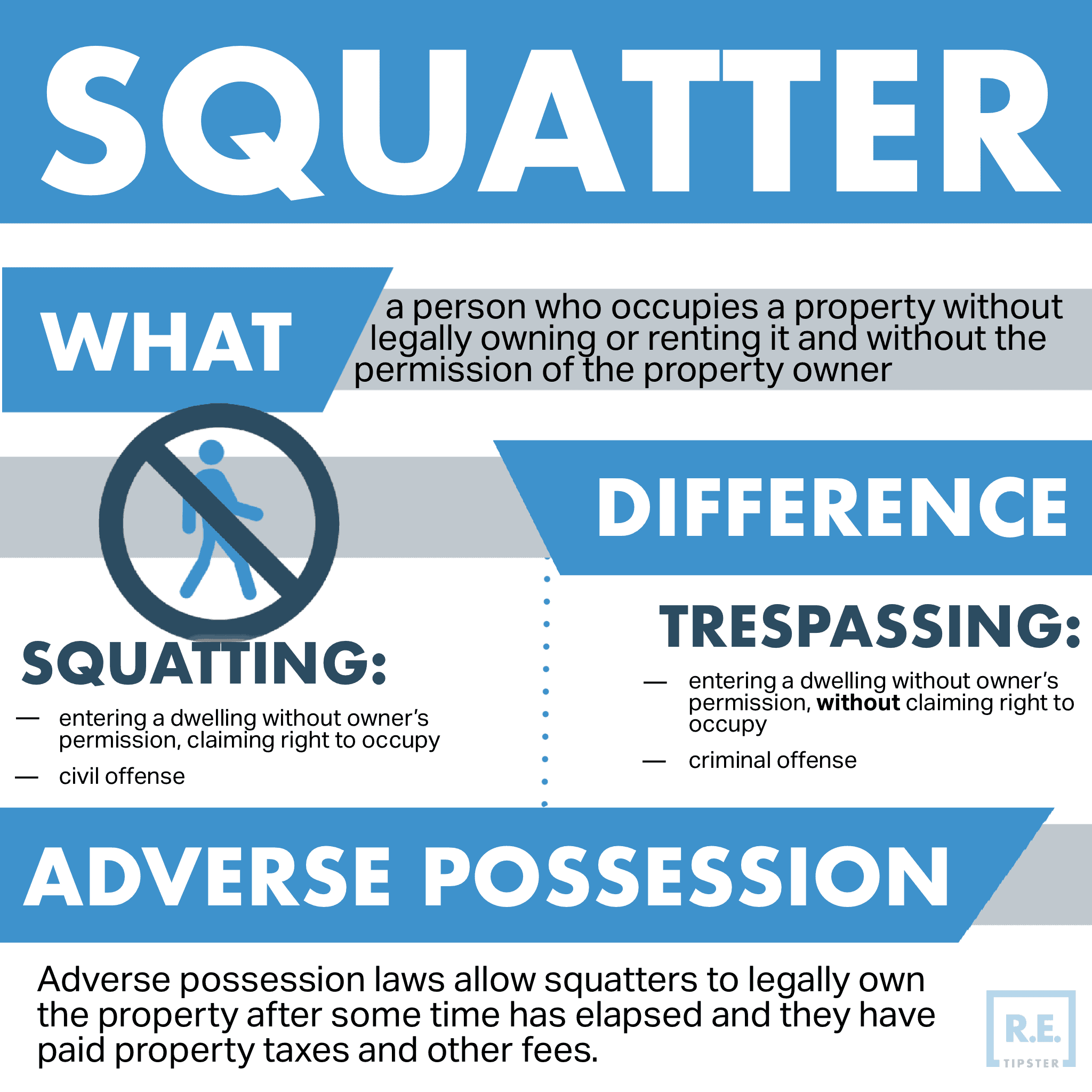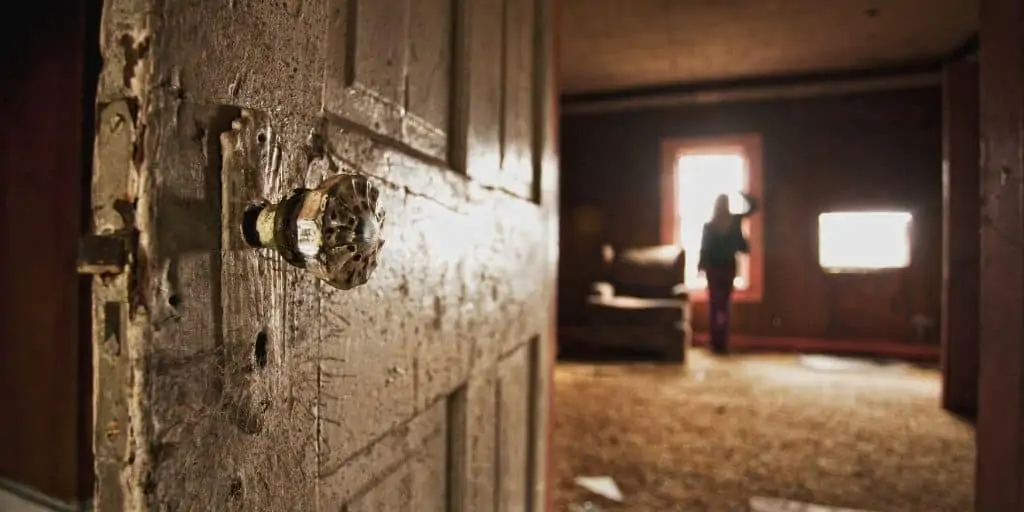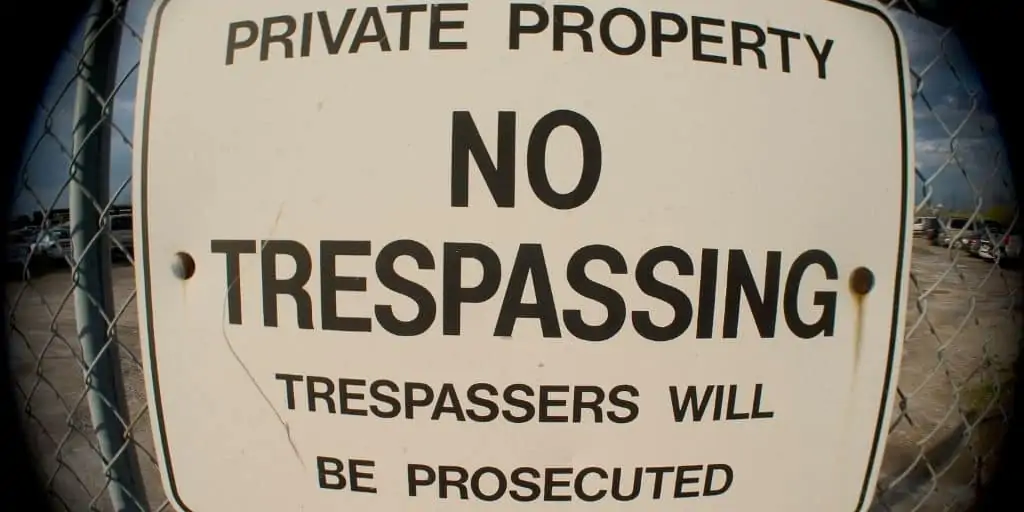What Is a Squatter?
REtipster does not provide legal advice. The information in this article can be impacted by many unique variables. Always consult with a qualified legal professional before taking action.
Do Squatters Have Rights?
Squatters occupy a property without the owner’s permission, and they do not pay rent. There is no contract, implied or otherwise, so squatters do not fall under the landlord-tenant law.
Still, a squatter has a few rights, especially in adverse possession or the act of occupying a vacant property. In many states, the property owner has to serve the squatter an eviction notice and go through the lawful process of eviction to get rid of squatters.
Adverse possession laws even allow squatters to legally own the property after some time has elapsed and they have paid property taxes and other fees. If the squatter obtains the rights to the property this way, they do not need to pay the owner any amount.
That said, adverse possession laws differ from state to state. For example, in California, continuous possession of a property for five years entitles a squatter to claim it in adverse possession. Meanwhile, in Ohio, the required period is 20 years[1].
Why Do Squatters Have Rights?
Squatters have rights partly because the government would rather have someone living in, paying taxes for, and taking care of a property rather than the actual owner neglecting or misusing that property. In other words, adverse possession is supposed to prevent property abandonment[2].
In addition, squatters’ rights also deter vigilante justice. Landowners cannot threaten with violence or use violence to remove a squatter, as this might lead to escalation and danger. Violence resulting from the use of vigilante justice can become a larger threat to society. While a squatter is not protected by landlord-tenant laws, they are entitled to negotiations under the law.
Squatters have rights also because, without this protection, it would be difficult to keep real estate markets stable wherever there are squatters[3].
BY THE NUMBERS: All 50 U.S. states have squatters’ rights, also known as adverse possession laws. The length of time it takes for a squatter to claim ownership differs from state to state, from as little as five years to as long as 20 or more years. In some of these states, the number of years may be reduced if the squatter can produce the required documentation, such as proof of paying the property taxes.
What Are the Requirements for Adverse Possession?
The law may differ in every state, but these are the common law requirements for adverse possession:
- The squatter should have continuous possession of and pay taxes for the property for the required number of years in that state.
- The squatter should exhibit hostile possession, i.e., the squatter is infringing on the owner’s rights and does not have the owner’s permission to occupy the property.
- The squatter should exhibit open and notorious possession, i.e., they are not hiding the fact that they are squatting from the property owner.
- The squatter should have actual possession.
- The squatter should have exclusive possession, i.e., they are not sharing ownership of the property and are rather controlling the property as if they owned it[4].
In adverse possession, being hostile does not mean having ill will or malice. It means the person claiming possession can demonstrate that they never had the true owner’s permission to use the property. In court, the owner might be able to challenge and destroy an adverse possession claim by stating that they gave implied permission for the use of the property to the person claiming adverse possession[5].
Squatter vs. Trespasser: What’s the Difference?
A property owner should know the difference between a squatter and a trespasser to handle the matter accordingly.
A squatter finds an unoccupied house, apartment, or any other dwelling and lives in it without the owner’s knowledge or permission. A squatter will often claim they have a right to occupy the property[6].
On the other hand, while a trespasser also enters a dwelling without the owner’s permission, they do not claim to have any rights to the property. Although it’s worth noting, a trespasser who occupies a property long enough can eventually become a squatter.
In most cases, trespassing is a criminal offense, while squatting is a civil one. However, in some jurisdictions or instances, squatting can also be considered criminal behavior[7].
How Can Property Owners Prevent Squatters?
Owners and property managers can prevent squatting by frequently and regularly inspecting their property. It also helps to install No Trespassing signs throughout the area, especially if the property is unoccupied. All entrances must be properly secured.
Owners who cannot check on their property, especially for extended periods, can hire a qualified property management company.
If the property is a rental, the owner or manager should have a checklist that tenants have to fill out when they move in and again when they move out[8].
If squatters are already present, the owner should not force them to leave. This may lead to the squatters eventually suing the owner or worse, becoming violent. Instead, the owner can call the police, who will determine whether the squatter is a trespasser or a squatter.
Trespassing is a criminal offense, and the police can immediately remove the trespasser. In many cases of squatting, the police cannot forcibly evict the squatter. The owner might have to take the matter to court.
The property owner should start the eviction process as soon as possible by serving the squatter with an eviction notice before filing a lawsuit. The squatter may refuse to move out of the property, at which time the owner may file an unlawful detainer, allowing the owner to ask the court for legal remedy.
The owner can ask the squatter to leave once the court rules in the owner’s favor. They can ask local authorities to help them if the squatter still refuses to leave.
Takeaways
- A squatter is a person who trespasses into a property, lives there, and claims to have rights over the property without the true owner’s permission.
- Squatters have rights under the laws of adverse possession, which makes it possible for them to eventually become the legal owners of the property they are squatting in.
- Squatters have to fulfill certain requirements before being able to file adverse possession of a property, and property owners can take certain legal steps to prevent or remove squatters.
Sources
- Rohde, J. (2021). What Landlords Need to Know About Squatters Rights in 2021. Retrieved from https://learn.roofstock.com/blog/squatters-rights
- USLegal. (n.d.) Squatters Rights Law and Legal Definition. Retrieved from https://definitions.uslegal.com/s/squatters-rights/
- Bowman, M. (2021). What Are Squatters’ Rights? Retrieved from https://andersonadvisors.com/squatters-rights/
- Farkas, B. How “Hostile” the Use of Property Must Be for Adverse Possession Claim. (n.d.) Retrieved from https://www.nolo.com/legal-encyclopedia/how-hostile-the-use-property-must-be-adverse-possession-claim.html
- Archer, D. (2021). Squatters’ Rights in California. Retrieved from https://archermanagement.group/california-squatter-laws/
- Papandrea, D. (2021). What Is a Squatter? Retrieved from https://www.thebalance.com/what-is-a-squatter-5194185
- Bullock M. (2021). Squatters vs. Trespassers: Their Rights and the Eviction Process. Retrieved from https://www.apartments.com/rental-manager/resources/article/squatters-vs-trespassers-their-rights-and-the-eviction-process
- Koren, L. (2021). How to Prevent Squatters From Occupying Your Vacant Property. Retrieved from https://luxurypropertycare.com/prevent-squatters-occupying-vacant-property/











